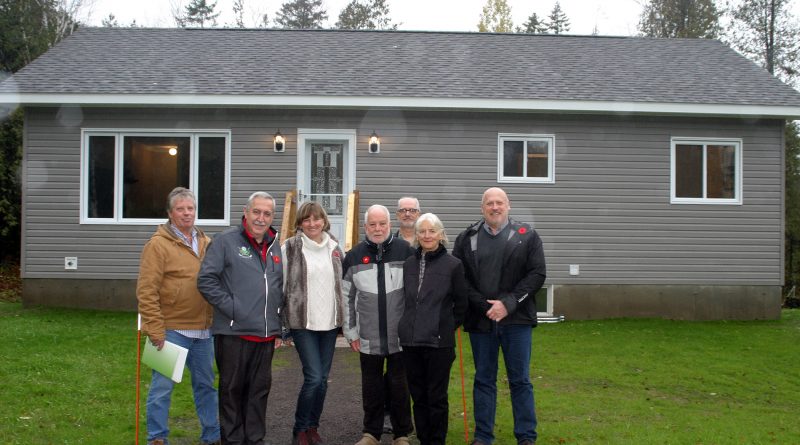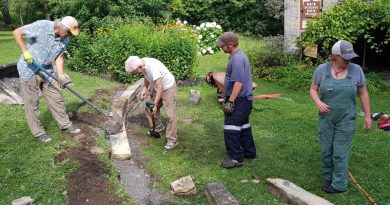A coach house in Corkery
By Jake Davies - West Carleton Online
CORKERY – It’s a new option for parents looking to downsize, and the owner of West Carleton and rural Ottawa’s first coach house, says it’s been a great way to bring her family closer together.
Kelley Foley, who lives just off March Road in the Corkery area, opened the doors of her new coach house for a small open house featuring the coach house builders, Coun. Eli El-Chantiry and the home’s hew tenants – her parents.
“It’s made my life so much easier having them around,” Foley said from her Grey Fox Drive home Friday morning (Nov. 2).
Foley’s husband passed away a few years ago leaving her home alone as the only breadwinner and sole parent to two young boys Morgan, now 12, and Connor, 14 – one of whom is on the autism spectrum.
Around the same time, her parents were looking to downsize.
“We looked at lots and lots of options,” Foley told West Carleton Online. “We looked at condos, smaller houses, different areas. Even adding an addition to my house would have been more expensive.”
So, Foley and her parents Linda Couturier and Don Goodwin chose to take advantage of a recent City of Ottawa bylaw change related to building and allowing coach houses on homeowner properties.
A coach house is a freestanding building separate from the main house but built on the same lot. Coach houses are seen as a way to increase the availability of affordable housing options and bring more density to established neighborhoods without negatively impacting public spaces like streets or parks.
In October 2016 Ottawa council amended its bylaw to allow coach houses on residential property.
According to City of Ottawa requirements, a lot may be eligible for a coach home if it is serviced by municipal sewer and water (or larger than 0.8 hectares if serviced by private well and septic). Only one coach house is allowed per principal residence on the property. Further, coach houses “are only permitted on lots with a detached, semi-detached, duplex or townhouse dwelling and where the primary dwelling does not contain a garden suite, rooming units or a secondary dwelling unit.” The coach house must have direct pedestrian access to a public road by a pathway that is at a minimum 1.2 metres wide. Parking for a coach house is not required. Coach houses can only be at most 40 per cent the size of the principal residence and there are height restrictions as well.
Because Foley’s coach house is the first in rural Ottawa, it created challenges for the homeowner and the city.
“That was the biggest challenge – how do you do this?” Foley said. “Once we figured that out, it came together quite quickly after that.”
The coach house is a Guildcrest Homes pre-fab home, built in a warehouse and erected on site.
Construction started in June and Foley’s parents moved in last August.
“The parents love it,” Foley said. “My dad has started walking again and my mom is loving doing her outside stuff again. We can split all our services now. It’s really become a very flexible option.”
It was also a learning experience for all involved. Originally, Ottawa bylaws stated coach houses can only be built on two-acre lots. Foley’s is 1.98. City staff insisted Foley needed septic and water permits, but the coach house would share water and septic with the primary residence.
“Staff and the city tried desperately to help, but it was a learning experience for them too,” Foley said. “Being the first one, we were able to tailor it to our needs. I’m very happy when I get my way.”
Foley said the new coach house legislation probably saved her three times the cost in permits compared to building a new home.
Foley’s dad says the whole process went well.
“It’s very nice,” Goodwin said the new digs. “It was very worthwhile working with Sean (Kelly, Guildcrest homes). They were very open to our ideas.”
The family got to tour the factory where the home was built.
“Once we knew we could do what we wanted, we were excited,” Foley’s mom Couturier said.
Kelly, says it took under an hour to put the house on the foundation (see video here). Once the home is attached to the foundation, skilled labour installs the flooring and paints the interior.
Kelly said Guildcrest Homes is doing a number of projects in the area. They are currently assisting three families affected by the tornado in the Dunrobin area. Guildcrest Homes has offered $5,000 off the cost of their prefab homes for anyone affected by the tornado.
Coun. Chantiry said several councillors including Rideau-Goulbourn Ward Coun. Scott Moffat, and city staff came out to the site during the process to see how it works and how it can be a benefit in their own communities.
The councillor also pointed out one more advantage for owners of West Carleton’s first coach house.
“Kelley’s kids are living the dream,” El-Chantiry said. “Whenever they fight with mom, they can go visit the grandparents.”












Pingback:Small home builder says bylaw a boon to WC – West Carleton Online